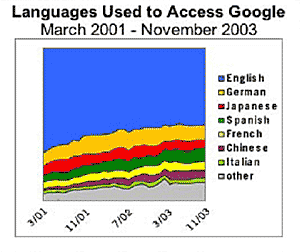English has been the primary medium of communication for business executives the world over for many decades now. However due to the rise of Asian giants like China, Japan and India this is set to change. Coupled with globalization and adoption of the internet in all spheres of life this change is further likely to accelerate.
A quick look at the internet users in the picture below shows that only 36.5 per cent of user demand English as the medium of communication on the information highway in 2005! While no recent statistics are available the author is fairly confident that internet would have only gotten better for non-English speakers in the meantime.
Which language pairs must you choose?
A quick look at the report from Google further strengthens the argument that this will be a century where CJK (Chinese, Japanese, Korean) and FIGS (French, Italian, German, Spanish) will dominate the internet in general and business communications specifically.
Opportunity for Indian linguists
The emergence of newer centres of “language gravity” suggests that economic opportunities abound for aspiring professionals who can specialise in two ways:
– Have a very good command of at least one language from the two major groups viz. FIGS and CJK
– Have a good understanding of one or more domains ie industry specialisations like machinery manufacturing, IT/software, pharmaceuticals, legal/patents etc.
The world is looking to Indian linguists for their renowned proficiency in English in addition to one of the above FIGS/CJK group. It is highly unlikely that an accomplished Indian professional would get work for English to French but would instead get many offers for French to English translations. Hence, written skills in English must be of a high-quality and capable of international acceptance.
While the above paragraph suggests good skills as a pre-requisite for taking advantage of economic opportunities, there are some serious issues when global companies deal with Indian professionals, which can be summarised as follows:
1. Lack of reliability in terms of deliverables
Deliveries often follow “Indian Stretchable Time”. This means Monday delivery does not refer to 9 am on Monday but 11.59 pm on Monday (sometimes the system clock time is changed to show the time that is needed).
If one cannot deliver on time, it is better to refuse an assignment than to sully one’s reputation in the market. Given a host of online forums, keep a look out for “blacklisted” linguists all the time.
2. Lack of quality in editing
Prevailing popular misconception indicates that Indians speak good English and hence their written English of an equally good quality. However, most linguists from India suffer from writing “Inglish” with strong “mother tongue influence”. Whilst this may not seem out of place within the Indian context, mostly such documents invite a lot of adverse comments from clients who expect higher standards, that suit American, British or Australian audiences (depending on the country being targeted for that document).
3. Changing your “asking” price after starting the job
While this is not so common these days, a few years ago it was not uncommon to come across freelancers who demanded a raise a few days into the project. This is surely the best way to be blacklisted for any future work from localisation agencies!
None of the above suggests requirement of any extraordinary or supernatural skills — these are merely the traits of any professional!
What must an aspiring linguist do?
Skills acquisition
Fairly simple answer: Do what you say and only say what you can do. This looks fairly simple, however, it is a habit that can be inculcated only if one consciously practices it. Acquiring skills would mean taking a diploma course in translation, which should not be confused with a language course.
Market oneself
Firstly, there is nothing to beat the home advantage. Hence, identify a translation agency in your city and do some research about their work. Customise your CV (not to be mistaken with doctoring the profile) to highlight the areas in which you have worked that may interest them. If you are a beginner then please state so and also describe the domains that you would like to specialise in. You would also need to demonstrate that you have taken some interest to build up skills in the domain and voraciously study books on the subject of your interest.
For example, if you wish to become a specialist financial translator in Japanese, you could read up about bonds, derivatives or other topics and prepare a Japanese to English glossary of terms to demonstrate your keenness for this specialisation. Once you have prepared yourself for the first meeting, call them up and ask to meet with the vendor manager or a project manager and pitch for business with them.
Once you have conquered your home territory, you can list yourself in any of the online forums like ProZ, Translators Cafe, eLance or any of the other million online directories for such work.
Make it easier for people to choose you
It is unlikely that you are the only translator in your chosen field. Given this truth, you must be prepared for countering questions like “why should I add you to my list of translators” and so on. Think about intelligent answers in addition to lowering your price to gain entry (especially applicable for beginners). Other reasons could be:
– Offer expertise not easily available (subject matter)
– Learn to deliver work using leading CAT tools like SDL TRADOS or other lesser-known tools
– Offer competitive rates by trawling the internet and doing some basic market research
– Offer extended payment terms like credit of 60 or 90 days. Most agencies receive payments from their clients in 60 or 75 days and would be averse to paying you before that
– Be easily accessible at all times by providing a mobile number contact or committing to respond by emails within 30 minutes
– Be available to work weekends for urgent submissions
– Have a Paypal or Money Bookers account (or for that matter any other online payment mechanism)
– Finally, make sure you have an internet connection that is extremely robust, able to handle large files and most importantly with a zero downtime
The Pros & Cons
The greatest advantage of being a freelance translator is that you can choose the work you want and the working hours you want. You can choose not to be available for weekends, holiday assignments or extended periods of time and you are pretty much the master of your own destiny! All of this assuming that you are really the best in your chosen field. If not, being selective will not help and you will find you have to fight hard to beat the competition. The reason’s fairly clear — most agencies and clients today have access to every translator/linguist on the planet who possesses an email account!
A career in translation
Most individuals would love the idea of being a freelancer and choosing the work/time variables based on their convenience. However, the most successful ones also tend to be the most hardworking.It would not be uncommon to see linguists/ translators putting in 15-hour workdays whilst working in large and often highly remunerative projects.
Ref: www.nihongobashi.com




